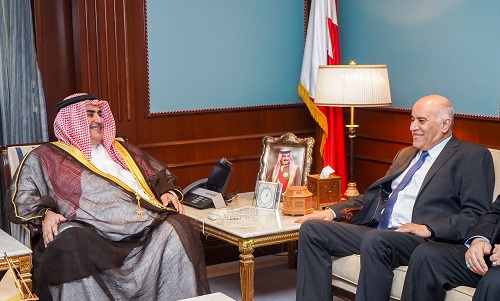Australia/Israel Review
The case for the Bahrain economic confab
Jun 3, 2019 | Raphael Ahren

It’s easy to be cynical about US President Donald Trump’s desire to clinch the “deal of the century.” It’s even easier to dismiss next month’s US-Bahraini economic “workshop” to aid the Palestinians, which is billed as the first step in rolling out the administration’s much-anticipated peace plan, as a predetermined failure.
The Americans are planning a wedding but have forgotten to invite the bride, more than one pundit scoffed this week, noting correctly that the Palestinians are not interested in attending the Manama conference.
It’s true that the event is unlikely to lead to a breakthrough in the long-stalled Israeli-Palestinian peace process. Peace will not break out after the June 25-26 summit, and probably not after the second part of Trump’s peace plan is unveiled either.
But the focus on Ramallah’s refusal to engage with a US administration it views as hostile misses a very important point: the mere fact that the peace proposal’s rollout will take place in an Arab capital is nothing less than a sensation.
On paper, the Arab world has firmly rebuffed and rejected the various recent Trump Administration initiatives and moves regarding the Israeli-Arab conflict, which were seen as presents to the Israeli government.
There was barely a country in the region that did not condemn the US recognition of Jerusalem as Israel’s capital, the relocation of the embassy, or the drastic cuts to the UN agency for Palestinian refugees UNRWA and other Palestinian causes.
Even the American recognition of Israeli sovereignty over the Golan Heights was overwhelmingly condemned, including by enemies of Bashar Assad’s Syria.
And yet, the Kingdom of Bahrain is willingly playing host to the ceremonial unveiling of the Trump Administration’s peace plan.
Just a few months after Washington cut all financial aid to the Palestinian Authority, Bahrain co-issued an official statement saying next month’s “Peace to Prosperity” workshop will focus on an “achievable vision and framework for a prosperous future for the Palestinian people and the region.”
To be sure, that’s not an endorsement of the political part of the US peace plan, which is expected to be released at a later stage.
Hosting senior Palestinian official Jibril Rajoub in Manama on Monday, Bahraini Foreign Minister Khalid bin Ahmed al-Khalifa reiterated his government’s “unequivocal position in supporting the Palestinian cause,” and the Palestinians’ right to an independent state on the pre-1967 lines with east Jerusalem as its capital.
It is unlikely that the Trump peace plan will adapt these parameters.
Still, the mere fact that an Arab country, which has no formal ties with Israel and continues to pledge allegiance to the Palestinian cause, has agreed to put its name to the first part of the Administration’s two-part peace plan is astonishing.
Yes, few Palestinians, if any, will be present at the Manama conference hall, where the peace proposal’s main architects, Jared Kushner and Jason Greenblatt, will try to recruit supporters. That’s their choice. But what’s worth highlighting is that this first major parley on the Trump team’s planned path to Israeli-Palestinian peace is to be focused solely on the interests of one side, and that’s not Israel. The meeting, rather, is devoted to the Palestinians’ economic well-being.
Worth highlighting, too, is that Israel’s Finance Minister, Moshe Kahlon, is likely to be among the guests welcomed to this Arab capital.
It’s not unprecedented for senior members of the Israeli cabinet to officially visit Arab countries. At the highest level, Prime Minister Binyamin Netanyahu made an official visit to Oman last October.
At ministerial level last year, Culture and Sports Minister Miri Regev attended a judo tournament in the United Arab Emirates, and a few days later, Transportation and Intelligence Minister Israel Katz addressed a transportation conference in Oman.
But while those ministerial visits were trailblazing, it bears noting that they took place in the context of events hosted by international organisations that may have punished Abu Dhabi and Muscat had they excluded representatives of member states.
Kahlon’s expected participation in the Manama workshop would be of an entirely different nature. He would be welcomed in an Arab country not because its government would face sanctions otherwise, but with the explicit purpose of discussing the Trump administration’s peace efforts.
Kushner and Greenblatt may yet spectacularly fail in their mission to bring about an Israeli-Palestinian peace deal. But they never promised that the two warring parties would immediately sign on to the document they are planning to release this summer, ending a century-old conflict in an instant. It’s quite likely that they themselves have never believed this is possible.
What they did promise is to publish a blueprint for what they think is a fair and feasible solution to the problem. Many pundits suggested that, given the phenomenally low chances of success, the Administration would bury the plan indefinitely. The upcoming summit in Bahrain is the first indication that these predictions were wrong.
Regardless of how the Palestinians will react to the peace plan in its entirety (and let’s not kid ourselves; they will reject it) and what happens then (Israel may annex settlements, with possibly dramatic implications for the region), Bahrain’s willingness to host the “Peace to Prosperity” summit strongly indicates that the Arab world is more inclined to normalise ties with Israel than some may think. Even in the absence of the ultimate deal.
Raphael Ahren is the diplomatic correspondent at the Times of Israel. © Times of Israel (www.timesofisrael.com) reprinted by permission, all rights reserved.
Tags: Gulf states, Israel, Palestinians






